


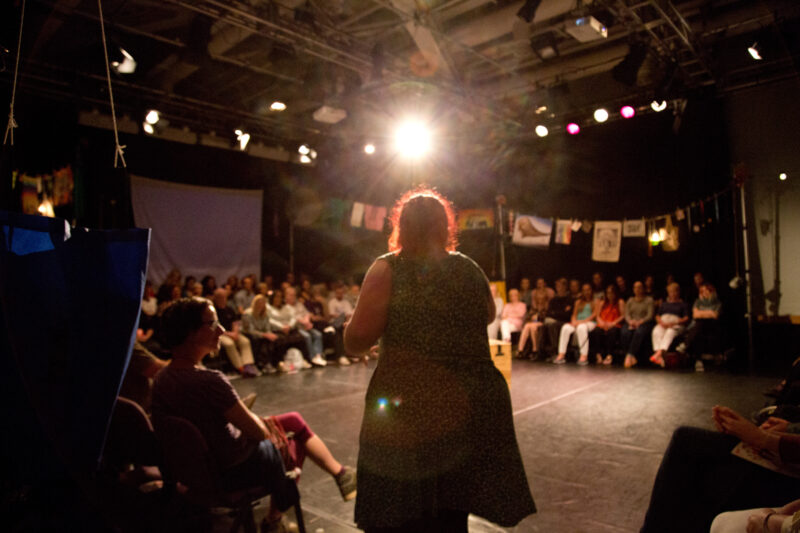
If you follow us on social media, you’ll have seen a lot of stuff about our play Declaration,a frank, funny and fearless journey through ADHD and mental health.
We’re touring Declaration across the UK until the end of November. Thinking of joining us but want to know what Declaration is all about? Well fear not, co-creator and director Rachel Moorhouse sat down to tell us all about what we can expect.
When Sarah was 4 her Mum took her to the Drs because she was inquisitive, hyperactive and excitable with an unquenchable thirst for knowledge.
Sarah had always felt different; but as a child of the early 80s, she grew up before ADHD (Attention Deficit Hyperactive Disorder) was acknowledged as a medical condition, so never received diagnosis. Her childhood Dr advised her Mum keep her busy and cut down on sugar. The sugar didn’t make much difference, but keeping her busy seemed to help, for a while. Until she reached 30 and realised she wasn’t coping.
Declaration sparked from Sarah’s experience seeking diagnosis for ADHD (Attention Deficit Hyperactive Disorder) in her 30s. It was born out of a visit to the Doctors which didn’t end the way she thought it would and explores the complexities and challenges that people are faced with when receiving a medical diagnosis.
With autobiographical storytelling, comedy, and conversations with audiences, Declaration is a vibrant and daring adventure of school day survival tactics, super-hero alter-egos and the stumbling blocks to self-acceptance.
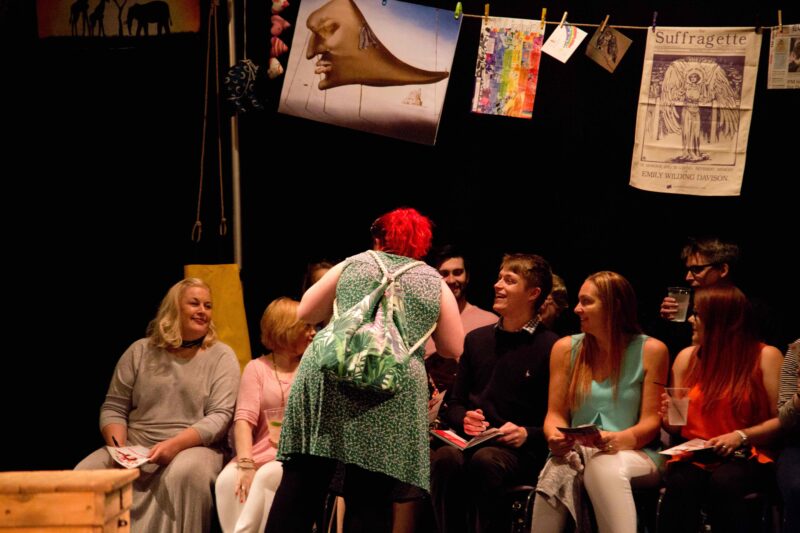

The show deals with ADHD, how do you make it work for wider audiences who don’t necessarily have experiences with the condition?
At its heart Declaration is about what it feels like to realise that something about you is different. Its about the faces we all find ourselves wearing in order to fit in and what happens when we dare to stand out.
The play may follow Sarah’s story, but its relevant to anyone who has ever struggled to be accepted or to accept themselves.
It starts with Sarah, but it ends with you, the audience.
How have you found directing an autobiographical show? How do you negotiate decisions about where the piece should go?
Myself and Sarah have worked together for a long time and we wrote and devised Declaration together, so the work was already embedded in me before stepping into a directing role.
We developed Declaration over a long period of time. It was born out of a difficult personal experience, but the aim was to take that experience and turn it into something useful and positive. With ADHD there is so much ground to cover and we explored a lot of it in the rehearsal room, but eventually you have to decide on a direction and areas of focus.
First and foremost we wanted to make a piece of theatre which people could relate to, something audiences could recognise themselves or someone they loved within. There is always a risk with autobiographical theatre that it can become an hour of naval-gazing therapy. It’s important to us that everything we make is relevant and useful for people.
We wanted Declaration to be a warm, welcoming and relatable experience. With mental health and diagnosis a central focus, it was vital that the play was curious and playful as well as provocative.
There were also personal and political factors which drove us in certain directions. So often in diagnosis the focus is on the negatives of a condition, rarely are we given a chance to celebrate the positives; Declaration is a hopeful celebration of the many positive aspects of ADHD.
With Declaration we wanted to address some of the gendered stereotypes surrounding the condition. When Sarah was diagnosed she struggled to find visible adult women role models. During our research we learnt that boys are nearly 3 times more likely to be diagnosed with ADHD than girls because girls are able to replicate behaviour and ‘fit in’ more easily, so symptoms are often missed or misdiagnosed. Declaration places women and ADHD on the public agenda.

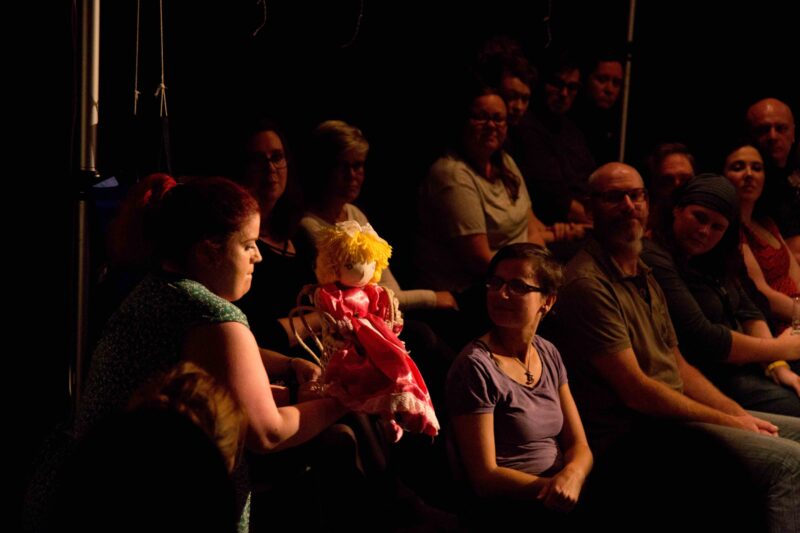
Declaration is staged in the round, in a den like structure and is adapted depending on whatever space we’re in, so its always exciting to see what it will look like on any given day.
Declaration is interactive so it is wildly different depending on the audience, their responses and energy drive sections of the piece in different ways. We’ve had so many brilliant, bonkers and beautiful things happen during performances, thanks to audience members offering so much energy.
We’re touring to a wide range of venues, some community focussed venues in small towns, and other more established spaces in larger cities. We love this mix and work hard to develop new audiences for our work and the venues we travel to.
We are driven to make sure the work reaches the people it needs to, which often means we find ourself with audiences who’ve never stepped foot in a theatre before, let alone been part of an interactive performance in the round! The generous and genuine responses of these audiences are what drives us to make work, and they are often a big part of what makes each performance so special and unique.
For a piece about ADHD and Mental Health, Declaration is surprisingly upbeat. Audiences can expect an honest and hopeful personal tale told through storytelling, comedy and conversations with audiences.
The play is set inside a cosy and colourful den like structure and though the performance is interactive, there is no pressure to be involved. If you’re not up for it, we respect that and you can just sit back, relax and enjoy. For those who wish to, there are opportunities to get in on the action, with group sing-a-longs and the chance to ring a bell!
Declaration tackles some tough stuff, but it is also joyous, funny and celebratory and there’s some banging tunes to boot.
We have a wellbeing room called SPACE which tours with the play, curated by Steph Walker. SPACE offers a cup of tea, chat, wellbeing tips and activities, as well as signposting to wellbeing initiatives and services. It is open before, during and after the performance and is a space where people take time to take care of themselves.
A banging performance and free brew and biscuit… what’s not to love?!
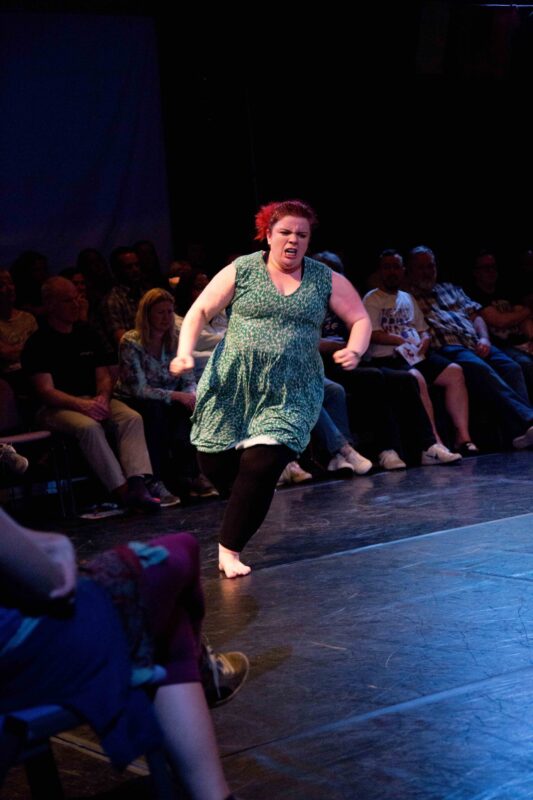
Declaration is a joyous and riotous dedication to square pegs everywhere, a celebration of people who dare or are forced to live outside society’s round hole.
We hope that audiences will leave Declaration feeling a little more comfortable within their skin, a little less alone and a little more connected to those around them.
Declaration asks audiences to think about what they need to support their personal wellbeing, and consider the needs of others around them. We hope audiences take the time out to do so.
We hope people will leave with more understanding and that Sarah’s fellow ADHD tribe will leave with a sense of personal pride and be able to celebrate all the brilliant attributes that make them who they are.

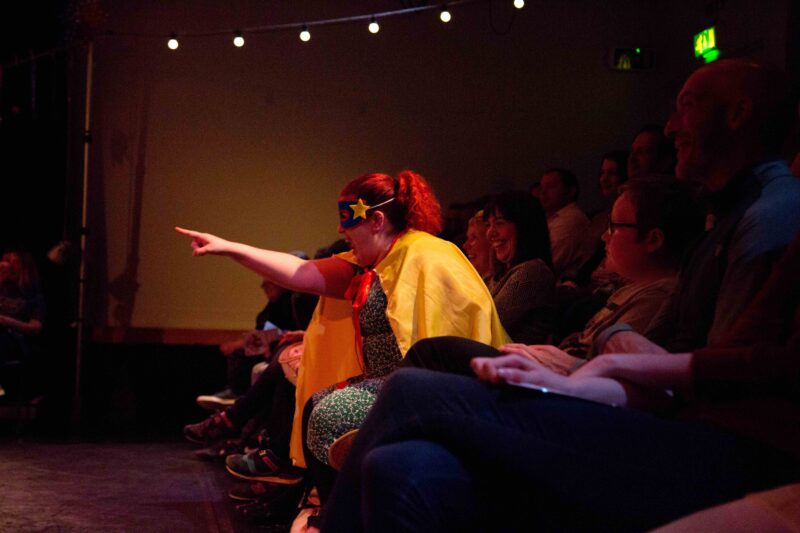
Initially, a week of sleep and Netflix!
Then myself and Sarah will be back in the Art with Heart office putting plans together for our next play, Stan. Stan, is a new play for children which explores communication, friendship, identity, the family unit… and dinosaurs. Named after the T-Rex at the Manchester Museum, Stan tells the story of a blossoming friendship between a boy who is struggling to cope with the departure of his father, and a deaf girl. As the pair bond over their shared love of dinosaurs and learn to communicate, she leads him into a playful imaginative world, which helps him deal with the change in his family.
We’re also cooking up some exciting projects with local communities back home in Salford, as well as delivering a series of workshops exploring Equality and LGBTQ+ history in schools across Greater Manchester.
Declaration will tours to Oxford, Sheffield, Derby and Wolverhampton this November.